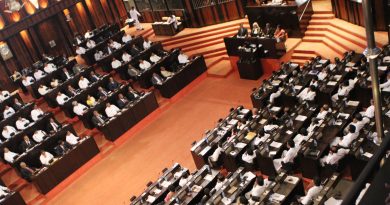(FT.COM) Will changes in Sri Lanka’s property laws open the floodgates to developers?
Next year’s budget set to ease the path for foreign buyers
Dan F Stapleton
DECEMBER 6, 2017
The release last month of the Sri Lankan government’s 2018 budget sent a ripple of excitement along the country’s south coast, where a modest number of sun-seeking expats have been renovating beachside villas and opening boutique hotels since the civil war ended in 2009.
The budget furthers president Maithripala Sirisena’s plans to boost foreign investment and trade, and continues to unpick the confusing property restrictions that have stymied development for the past decade.
Crucially, the latest changes will finally allow foreigners to buy property freehold within condominium developments, and will allow majority-foreign-owned companies listed on the Colombo Stock Exchange to purchase and build on freehold land. Currently, foreigners can only buy condo units on the fourth floor or above, and there is a blanket ban on majority-foreign-owned companies buying land. In Sri Lanka, condominiums are defined as any group of residences with shared facilities.
Agents say the changes pave the way for the sort of modern, serviced holiday villas that have proven popular in destinations such as Bali and Phuket. The changes could also lead to higher prices for properties on the south coast, which have already appreciated dramatically since Sirisena took office.
“Prices have gone up about a third in a year on the beach, and they’re still rising,” says Ivan Robinson, director of Lanka Real Estate. “Last year we sold property on the south-west coast for about $10,000 per perch [25 sq metres]. Today we are selling the same property for about $15,000 per perch.” He adds: “That’s still five times cheaper than a comparable beach site in Bali.”
The under-developed south, which is characterised by lush tea and cinnamon plantations and wild beaches, used to be difficult to reach. But the construction of an expressway when the war ended has cut down travel time between Colombo and Galle, the south’s main city, to two hours.
There is now a growing expat population — large enough to support an English-language international school in Galle — and a burgeoning tourist industry spreading along the coast from Galle, although the area still feels much less developed than some south-east Asian holiday destinations.
According to Robinson, the president’s election in 2015 was a watershed moment. “We now have a real democratic government which brings with it a real sense of economic freedom and is attracting more and more foreign investment,” he says.
In the south, the government’s efforts are helping to pique commercial interest in waterfront land. “In the past year, we’ve seen significantly more commercial investors — including hotel groups — buying land around here,” says Robinson. A three-year, $1.5bn support package from the International Monetary Fund, announced in June 2016, has also boosted confidence, he adds.
Share this graphic High-end developments have already started selling off-plan. In Talpe, a secluded beachfront enclave 5km east of Galle, Lanka Real Estate is selling a 47-unit project called the Serenia Residences, which is due for completion in December 2019. Prices in the development, which will include a restaurant and spa, range from $352,000 for a two-bedroom unit to $1.17m for a penthouse. Five have sold to date.
Prospective foreign buyers must wait for the new rules to come into effect before they can purchase these or other condo units freehold. Based on the passage of previous budgets, agents believe this will occur on January 1. Until then, foreigners can purchase condos on a 99-year leasehold basis or create a corporate structure which is 51 per cent-owned by Sri Lankans.
“Lawyers can create a corporate structure workaround which respects the law while giving the investor the security he needs,” says Eduard Hempel of Pearl Properties in Galle. This will remain the best way for foreigners to buy property other than condos, he adds. “We tend to advise people not to buy leasehold unless they’re very comfortable with who their freeholder is.”
That’s because, Hempel says, typical leasehold agreements in Sri Lanka compel leaseholders to ask permission of the freeholder to make any changes to the property. “Leasehold here [functions] more like a rental agreement,” he says.
Properties available in Talpe include a new four-bedroom villa with a pool and direct beach access for $1.8m, through Pearl. About 15km further east, in Weligama, Lanka Real Estate is selling a new five-bedroom villa with an infinity pool, gym, garage and direct beach access in a development of four for $2.8m.
Galle Fort property, $1.15m © Shehan Dinomal Obeysekara Alex Reilley, founder of the UK restaurant chain Lounges, first visited Sri Lanka at Easter this year and decided almost immediately to buy a holiday house on the south coast. He has since purchased a modern five-bedroom villa with a pool and landscaped gardens in Talpe for about $1m.
“It’s been a whirlwind,” he admits. “But there’s a sweetness to the place. And you get a lot more bang for your buck than you would anywhere comparable in Europe.
” Lanka Real Estate is selling a three-bedroom new-build in Galle Fort — a Unesco-listed part of the city where colonial architecture dominates — with ocean views for $1.15m.
Robinson says fluctuations in international markets will have an outsized effect along the south coast, which is home to relatively few primary residences. “You spend money here if you have too much money in your bank account, or if you know something about the market,” he says.
Buying guide
- Sri Lanka’s land registry is being upgraded to an electronic system, but the current system is efficient and reliable
- Stamp duty on leasehold purchases is 1 per cent for both domestic and foreign buyers stamp duty on freehold purchases is 4 per cent
- It costs about $3,000 for a lawyer to incorporate a company structure to allow a foreigner to buy freehold land
What you can buy for. . .
$500,000 A 20th-century homestead in Weligama, 30 km from Galle
$1.5m A large newly built home in Talpe, 50 km from Galle
$3m A newly built family home in Unesco-listed Galle Fort
Source: Ft.com




